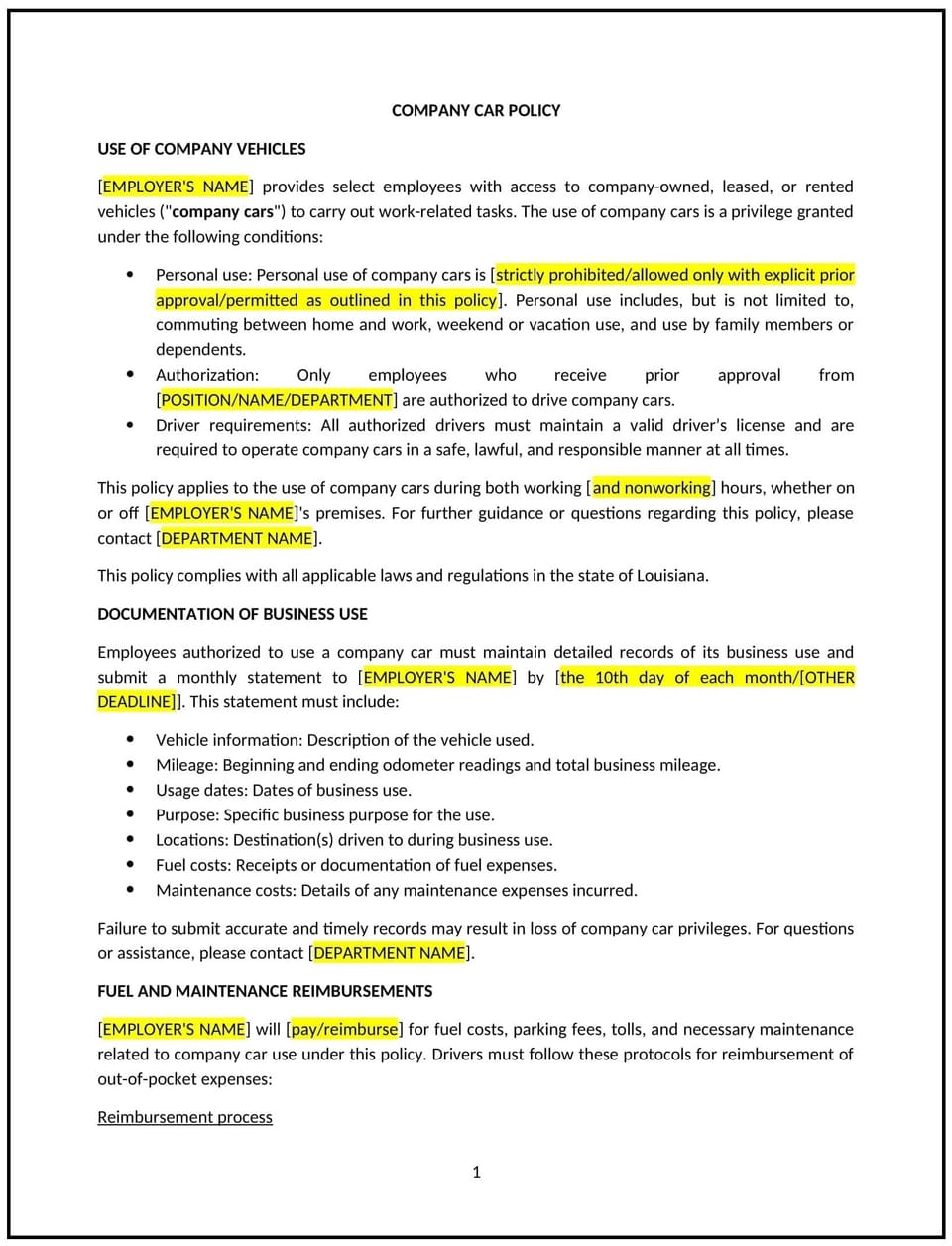Company car policy (Louisiana): Free template

Company car policy (Louisiana)
This company car policy is designed to help Louisiana businesses provide clear guidelines for the use of company-owned or leased vehicles. It outlines eligibility, responsibilities, and procedures to ensure safe, responsible, and efficient use of company vehicles.
By implementing this policy, businesses can promote accountability, protect assets, and streamline the management of company cars.
How to use this company car policy (Louisiana)
- Define eligibility: Specify which employees are eligible to use company cars based on their role or responsibilities.
- Outline permitted use: Clarify whether vehicles can be used for personal purposes and any restrictions on non-business-related use.
- Address maintenance responsibilities: Establish procedures for maintaining vehicles, including regular servicing and reporting issues.
- Include safety guidelines: Specify expectations for safe driving, such as adhering to traffic laws and prohibiting mobile phone use while driving.
- Detail expense management: Provide instructions for handling fuel, tolls, and other expenses, including reimbursement processes if applicable.
- Establish reporting requirements: Require employees to report accidents, tickets, or other incidents involving company vehicles promptly.
Benefits of using a company car policy (Louisiana)
Implementing this policy provides several advantages for Louisiana businesses:
- Promotes safety: Encourages responsible driving and adherence to traffic laws.
- Protects assets: Reduces the risk of damage, theft, or misuse of company vehicles.
- Clarifies responsibilities: Sets clear expectations for employees using company cars.
- Improves efficiency: Streamlines vehicle management and expense tracking.
- Enhances accountability: Encourages employees to care for company-provided vehicles.
Tips for using this company car policy (Louisiana)
- Regularly inspect vehicles: Schedule routine checks to ensure vehicles remain in safe and operable condition.
- Provide driver training: Offer training sessions for employees on defensive driving and safe vehicle operation.
- Monitor usage: Implement systems to track mileage and usage to prevent misuse.
- Set clear boundaries: Clearly communicate whether personal use of company vehicles is permitted and any associated limitations.
- Update policy as needed: Adjust the policy to reflect changes in business needs or Louisiana-specific driving regulations.
Q: Who is eligible to use a company car under this policy?
A: Eligibility is typically based on job roles or responsibilities, such as employees in sales, delivery, or executive positions.
Q: Are employees allowed to use company cars for personal purposes?
A: Personal use may be permitted depending on company guidelines, but any limitations or reimbursement requirements should be clearly defined.
Q: How should businesses handle fuel and other vehicle-related expenses?
A: Businesses can establish reimbursement procedures or provide fuel cards to employees for covering expenses like fuel, tolls, and parking.
Q: What steps should businesses take if a company car is involved in an accident?
A: Employees should report the accident immediately, follow the company’s reporting procedures, and provide all necessary documentation for insurance claims.
Q: How can businesses track vehicle usage?
A: Businesses may use mileage logs, GPS tracking, or periodic audits to monitor company car usage and prevent misuse.
Q: How often should company cars be serviced?
A: Regular servicing schedules should align with manufacturer recommendations and be tracked by the business or assigned employees.
Q: How often should this policy be reviewed?
A: The policy should be reviewed annually or whenever there are updates to Louisiana driving laws or company vehicle management practices.
This article contains general legal information and does not contain legal advice. Cobrief is not a law firm or a substitute for an attorney or law firm. The law is complex and changes often. For legal advice, please ask a lawyer.


